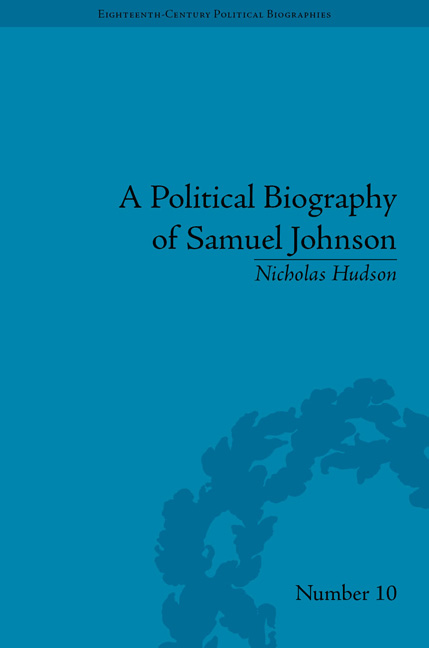Book contents
- Frontmatter
- CONTENTS
- Dedication
- Acknowledgements
- Note on the Text
- Introduction
- 1 Political Origins, 1709–36
- 2 The Patriot Opposition, 1737–9
- 3 An Independent Voice, 1740–55
- 4 The Seven Years War, 1756–63
- 5 Defender of King and State, 1763–70
- 6 Troubles of Empire, 1771–84
- Conclusion
- Notes
- Works Cited
- Index
Conclusion
- Frontmatter
- CONTENTS
- Dedication
- Acknowledgements
- Note on the Text
- Introduction
- 1 Political Origins, 1709–36
- 2 The Patriot Opposition, 1737–9
- 3 An Independent Voice, 1740–55
- 4 The Seven Years War, 1756–63
- 5 Defender of King and State, 1763–70
- 6 Troubles of Empire, 1771–84
- Conclusion
- Notes
- Works Cited
- Index
Summary
Among T. B. Macaulay's strongest and most consistent criticisms of Johnson was that he actually cared little about politics and thus knew little about them: ‘He was himself a Tory, not from rational conviction – for his serious opinion was that one form of government was just as good or as bad as another – but from mere passion’. When Macaulay wrote this judgment in 1856, he meant that Johnson's supposed demotion of politics sealed his irrelevance except as the entertaining literary character ‘Dr Johnson’ he found in Boswell's Life. Under the influence of ‘political economy’ and the reform-minded obsessions of their age, Victorians had come to understand politics as not peripheral but as central to the well-being of every individual. Donald Greene, for all the strong criticisms advanced in this book against his interpretations, corrected this widespread impression that Johnson was an irrational and ignorant commentator on political events of his time. Greene inaugurated the current debate, and did much to establish Johnson's political canon. Macaulay was nonetheless right in pointing to Johnson's frequent tendency to relegate politics to an inferior position in what truly mattered in life. As he wrote to Robert Chambers in 1783, ‘The state of the Publick, and the operations of government have little influence upon the private happiness of private men, nor can I pretend that much of the national calamites is felt by me’.
- Type
- Chapter
- Information
- A Political Biography of Samuel Johnson , pp. 191 - 194Publisher: Pickering & ChattoFirst published in: 2014



